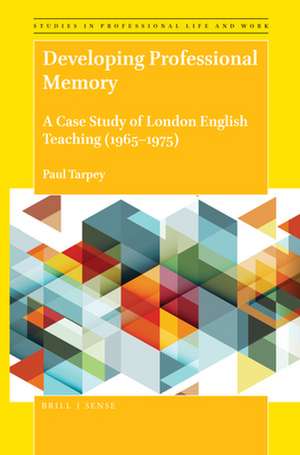Developing Professional Memory: A Case Study of London English Teaching (1965–1975): Studies in Professional Life and Work, cartea 13
Autor Paul Tarpeyen Limba Engleză Paperback – 25 iul 2018
By recovering and documenting the collective Professional Memory of English teachers in a particular conjuncture, this volume offers a compelling practitioner account of events and developments and proves that learning from Professional Memory has transformative potential. The author argues that by critically confronting narratives, practices and existing conjunctural circumstances, current practitioners might develop greater agency in debates around their professional roles and responsibilities.
Preț: 343.11 lei
Nou
Puncte Express: 515
Preț estimativ în valută:
65.65€ • 71.54$ • 55.32£
65.65€ • 71.54$ • 55.32£
Carte indisponibilă temporar
Doresc să fiu notificat când acest titlu va fi disponibil:
Se trimite...
Preluare comenzi: 021 569.72.76
Specificații
ISBN-13: 9789004380721
ISBN-10: 9004380728
Dimensiuni: 155 x 235 mm
Greutate: 0 kg
Editura: Brill
Colecția Brill
Seria Studies in Professional Life and Work
ISBN-10: 9004380728
Dimensiuni: 155 x 235 mm
Greutate: 0 kg
Editura: Brill
Colecția Brill
Seria Studies in Professional Life and Work
Cuprins
Chapter 1: Motivations, Locations, Intentions
Introduction
Motivations
Locations
Approaches
Structure of the Book
Chapter 2: Conjunctures, Contexts, Circumstances
Introduction
Progressive and Radical Traditions
Locating English into a Wider Genealogy of Context
The Changing Identity of English Teaching
Developments in Practice and Resources
John Dixon’s ‘Growth’ Model of English
Some Wider Developments
Events and Developments in the ILEA
The Bullock Report
Contending Polarities in English?
Chapter 3: Memories, Narratives, Relationships
Introduction
Collective Memory
Autobiographical and Historical Memory
Inner Speech and Speech Genre
Social Constructionism
Narrative Representation and PM
Chapter 4: Constructing Identities and Attitudes
Introduction
English before School and English at School
Attitudes to English Lessons
The Teaching and Activities in English Lessons
Memorable Teachers
Being ‘Bad’
University and Teacher Training College
Classroom
Developing Oral Work
A Focus on Children’s Agency
Developing Curricula and Assessment
Insistence on Mixed-Ability
The Influence of ILEA and the English Centre
Professional Development in Other Areas
What Do These Memories Tell Us?
Chapter 6: From ‘Cauldron’ to Current Contexts
Introduction
Attitudes to Regulation and Prescription
Is There a Continuing Relevance of the Teachers’ Practice?
What Defines This Generation of English Teachers?
Changes in Attitude
Has Something Been ‘Lost’?
Perceptions of Professionalism and Accountability
Can Lessons Be Learned from This Generation?
Suggestions for Future Developments
Are They ‘Progressive’ Teachers?
What Do These Memories Tell Us?
Chapter 7: Making Sense of the Memories
Introduction
Identities and Working Cultures in English Teaching
Are There Alternative Speech Genres in English Teaching?
The Importance of Confronting Conjunctural Circumstances
Is the Teachers’ Work Still Relevant?
Competing and Contested Currents in the Teachers’ Stories
Teacher Memory and Teacher Nostalgia
Political English Teaching?
Chapter 8: Conclusions, Implications, Destinations
Where to Next?
What Is PM and How Might It Be Significant?
What Practical Contribution Might PM Studies Make?
PM and History of Education
PM, Teacher Education and Professional Development
PM, English Teaching and Collective Memory
More PM Studies?
References
Index
Introduction
Motivations
Locations
Approaches
Structure of the Book
Chapter 2: Conjunctures, Contexts, Circumstances
Introduction
Progressive and Radical Traditions
Locating English into a Wider Genealogy of Context
The Changing Identity of English Teaching
Developments in Practice and Resources
John Dixon’s ‘Growth’ Model of English
Some Wider Developments
Events and Developments in the ILEA
The Bullock Report
Contending Polarities in English?
Chapter 3: Memories, Narratives, Relationships
Introduction
Collective Memory
Autobiographical and Historical Memory
Inner Speech and Speech Genre
Social Constructionism
Narrative Representation and PM
Chapter 4: Constructing Identities and Attitudes
Introduction
English before School and English at School
Attitudes to English Lessons
The Teaching and Activities in English Lessons
Memorable Teachers
Being ‘Bad’
University and Teacher Training College
Classroom
Developing Oral Work
A Focus on Children’s Agency
Developing Curricula and Assessment
Insistence on Mixed-Ability
The Influence of ILEA and the English Centre
Professional Development in Other Areas
What Do These Memories Tell Us?
Chapter 6: From ‘Cauldron’ to Current Contexts
Introduction
Attitudes to Regulation and Prescription
Is There a Continuing Relevance of the Teachers’ Practice?
What Defines This Generation of English Teachers?
Changes in Attitude
Has Something Been ‘Lost’?
Perceptions of Professionalism and Accountability
Can Lessons Be Learned from This Generation?
Suggestions for Future Developments
Are They ‘Progressive’ Teachers?
What Do These Memories Tell Us?
Chapter 7: Making Sense of the Memories
Introduction
Identities and Working Cultures in English Teaching
Are There Alternative Speech Genres in English Teaching?
The Importance of Confronting Conjunctural Circumstances
Is the Teachers’ Work Still Relevant?
Competing and Contested Currents in the Teachers’ Stories
Teacher Memory and Teacher Nostalgia
Political English Teaching?
Chapter 8: Conclusions, Implications, Destinations
Where to Next?
What Is PM and How Might It Be Significant?
What Practical Contribution Might PM Studies Make?
PM and History of Education
PM, Teacher Education and Professional Development
PM, English Teaching and Collective Memory
More PM Studies?
References
Index
Notă biografică
Paul Tarpey, Ph.D. (2015), UCL Institute of Education, is a lecturer in Education and Social Science at St Mary’s University, Twickenham. He publishes on Professional Memory and English teaching.








